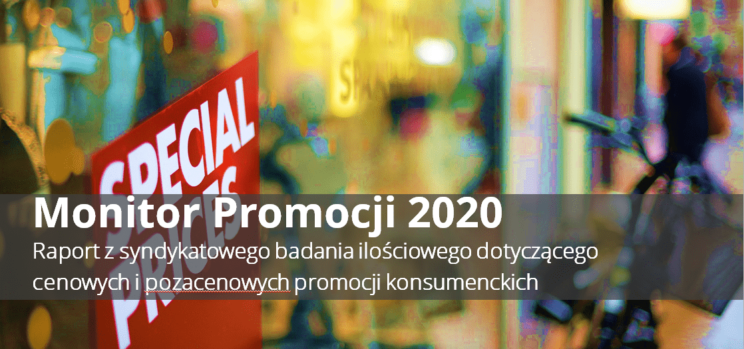How has COVID changed promotional campaigns?
COVID has changed the rules of promotions
The overriding reason for these changes was the introduction of the lockdown of the economy, the requirement to maintain a social distance and the obligation to wear masks at points of sale. The main changes in manufacturers’ offers are as follows:
- The lack of physical contact with decision-makers at the points of sale and the associated lower level of perception of the retailer have forced the simplification of promotional offers and made them more generic;
- The restrictions on visiting points of sale in traditional trade have shaped significantly simpler forms of package promotions so that dealers (especially independent distributors), can sell anything;
- Negative moods in society, lower purchasing power of consumers (and, consequently, retailers) resulted in promotion thresholds for applying a promotion set at far lower levels than during the same period of the previous year;
- In the face of the epidemic, the funds allocated to the budgets for acquiring additional market share points were transferred to support regular sales, which had a negative impact on its margin level;
- As a consequence of the rapid shift in trade from offline to online, the demand for digital content in communication has increased. This has provided buyers, who have been deprived of the opportunity to see the product in a traditional store, with an online experience, the same as in the case of the current multi-channel reality;
- The forced change of customer habits and the decrease in the number of “window shoppers” of consumer electronics and household appliances in chain points of sale, reduced the role of cross-selling, such as extended warranty when buying a fridge. It also reduced the demand for in-store sales support (as a result of a smaller number of visitors). This led to a decrease in the cost of sales, but also a decrease in margins due to inability to directly influence the activation of sales;
- Orders placed by retailers (including horeca) have moved to online channels (B2B e-commerce), due to lack of or limited opportunities to meet with sales representatives. The winners in this case were the manufacturers who had such purchasing platforms;
- The pandemic has also become a verifier of hygienic standards in the horeca channel. Hundreds of points of sale have fallen out of the market, especially small premises;
- Retail outlets that were able to introduce online sales efficiently, came out unscathed – after the end of the lockdown, a significant number of consumers still choose orders with delivery. This concerns both the horeca channel and retail chains with regard to the introduction of unmanned cash registers, cooperation with courier companies specialising in food transport, amongst other things;
- The burden of settling B2B promotional campaigns has been transferred to the seller – due to the limited visits of the representative at points of sale, it is the sellers who send the documentation of the tasks performed as part of the programmes in which they participate.

What information does the “2020 Promotion Monitor” provide?
- First of all, we learn that the importance of these promotional techniques, the implementation of which requires physical contact with the buyer (e.g. tasting), has decreased. There has been an increase of those that improve the overall benefit that buyers receive or those which improve the security of transactions (extra product free, money back).
- The report also contains valuable information about the co-use of promotions, which will help to develop promotional plans to match the promotional techniques used with different target groups.
- In the vast majority of cases, buyers make purchases in advance and increase the frequeny of purchases as a result of promotional campaigns offered. This is a direct result of the domination of price-related campaigns, which primarily affect existing buyers. For the sake of order, it should be noted that the determinant of purchase for stock has recorded a significant decrease – by as much as eight percentage points. (from 49% in 2019 to 41% in 2020). Since the study was carried out after the restrictions were eased, we will only be able to tell within a year from now whether it is a one-off event or a permanent trend. Non-price related techniques, and consequently brand change as a demand determinant, are in a minority of cases in Poland.
- There is a set of attitudes that Poles have which have not changed for years. They include a high percentage of preferences for financial prizes, expecting free participation in promotional actions via online services, and a reluctance to providing a PESEL number in application forms.
The Promotion Monitor was carried out this year on a sample group which excluded rural residents. From this perspective, the distribution of using loyalty programs looks very interesting. Among the urban population, they are used by as many as 75% of Polish people, and the second most popular programme is the Rossmann Club.
The ARC Market and Opinion institute is running the “Loyalty Programme Monitor” independent parallel survey, which is conducted on a representative sample of adult Poles. I encourage you to buy this report as well. It is worthwhile to compare the results of the use of these programs. And with such a shy attempt to cross-sell, I will say goodbye to you, wishing you many successes in your daily work. I especially wish you the best of health this year, too!
In i360 we support a number of loyalty programs. We organize hundreds of promotional campaigns: lotteries, bonus sales, competitions, etc. We also permanently monitor all important loyalty programs implemented on the Polish and selected foreign markets. We share our experience with our blog readers. For our customers we provide services of creating strategies and comprehensive loyalty program implementations. We provide our own software for B2C and B2B program management. We also provide legal and tax services, logistics and the optimization of program handling processes.

Contact us to learn more.
We know everything about loyalty programs.
![]() Tomasz.Makaruk@i360.com.pl
Tomasz.Makaruk@i360.com.pl
![]() 22 331.09.97
22 331.09.97
PS. Zdjęcie dzięki uprzejmości www.freepik.com
Tło plik wektorowy utworzone przez YusufSangdes – pl.freepik.com


